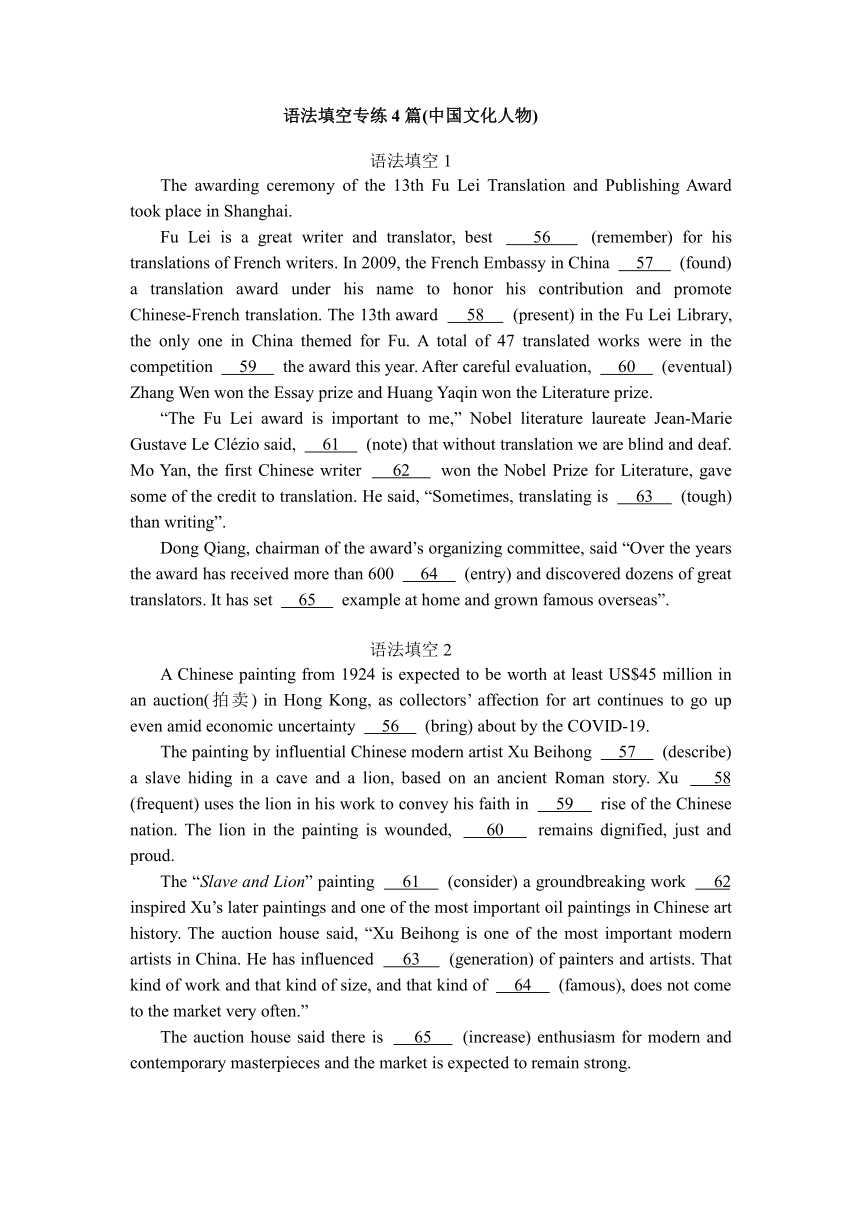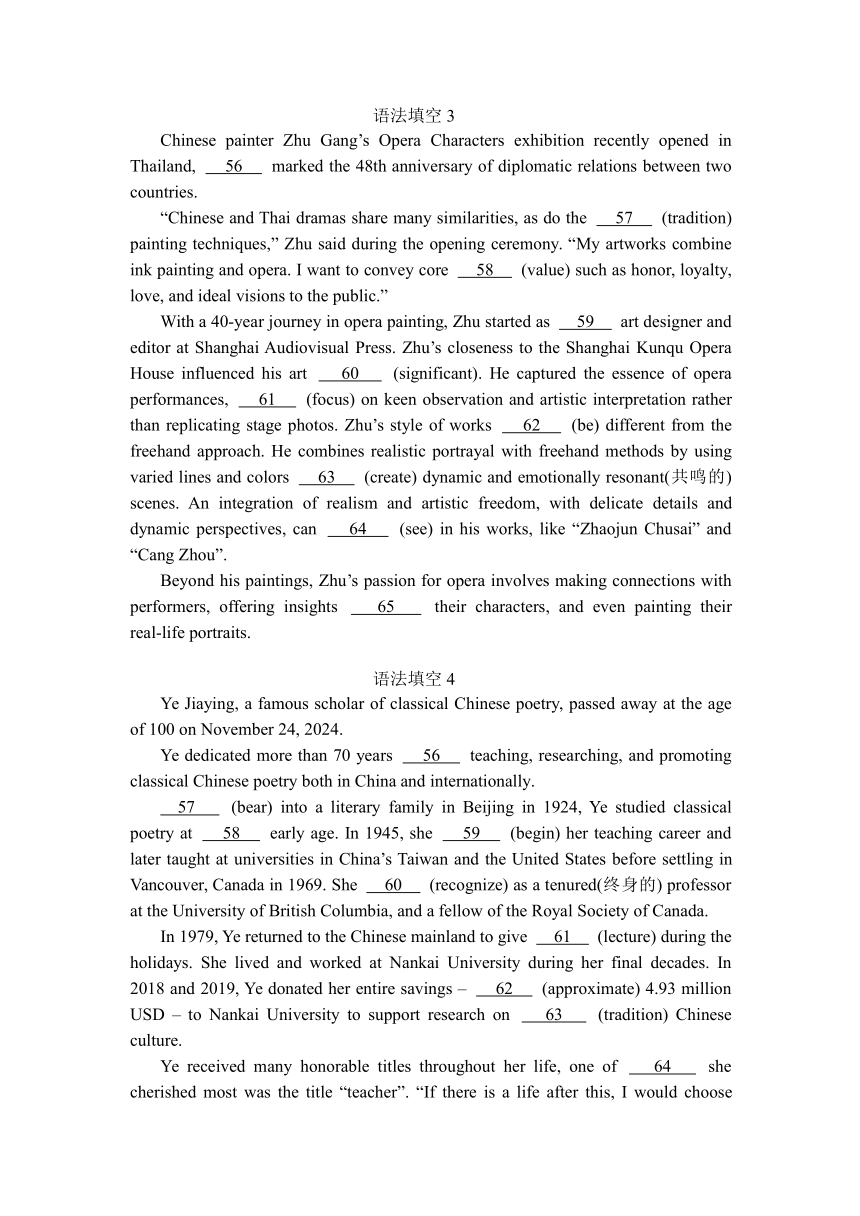2025届高三上学期英语一轮复习专项:语法填空专练4篇(中国文化人物) (含答案)
文档属性
| 名称 | 2025届高三上学期英语一轮复习专项:语法填空专练4篇(中国文化人物) (含答案) |  | |
| 格式 | docx | ||
| 文件大小 | 23.0KB | ||
| 资源类型 | 教案 | ||
| 版本资源 | 人教版(2019) | ||
| 科目 | 英语 | ||
| 更新时间 | 2024-11-28 00:31:10 | ||
图片预览


文档简介
语法填空专练4篇(中国文化人物)
语法填空1
The awarding ceremony of the 13th Fu Lei Translation and Publishing Award took place in Shanghai.
Fu Lei is a great writer and translator, best 56 (remember) for his translations of French writers. In 2009, the French Embassy in China 57 (found) a translation award under his name to honor his contribution and promote Chinese-French translation. The 13th award 58 (present) in the Fu Lei Library, the only one in China themed for Fu. A total of 47 translated works were in the competition 59 the award this year. After careful evaluation, 60 (eventual) Zhang Wen won the Essay prize and Huang Yaqin won the Literature prize.
“The Fu Lei award is important to me,” Nobel literature laureate Jean-Marie Gustave Le Clézio said, 61 (note) that without translation we are blind and deaf. Mo Yan, the first Chinese writer 62 won the Nobel Prize for Literature, gave some of the credit to translation. He said, “Sometimes, translating is 63 (tough) than writing”.
Dong Qiang, chairman of the award’s organizing committee, said “Over the years the award has received more than 600 64 (entry) and discovered dozens of great translators. It has set 65 example at home and grown famous overseas”.
语法填空2
A Chinese painting from 1924 is expected to be worth at least US$45 million in an auction(拍卖) in Hong Kong, as collectors’ affection for art continues to go up even amid economic uncertainty 56 (bring) about by the COVID-19.
The painting by influential Chinese modern artist Xu Beihong 57 (describe) a slave hiding in a cave and a lion, based on an ancient Roman story. Xu 58 (frequent) uses the lion in his work to convey his faith in 59 rise of the Chinese nation. The lion in the painting is wounded, 60 remains dignified, just and proud.
The “Slave and Lion” painting 61 (consider) a groundbreaking work 62 inspired Xu’s later paintings and one of the most important oil paintings in Chinese art history. The auction house said, “Xu Beihong is one of the most important modern artists in China. He has influenced 63 (generation) of painters and artists. That kind of work and that kind of size, and that kind of 64 (famous), does not come to the market very often.”
The auction house said there is 65 (increase) enthusiasm for modern and contemporary masterpieces and the market is expected to remain strong.
语法填空3
Chinese painter Zhu Gang’s Opera Characters exhibition recently opened in Thailand, 56 marked the 48th anniversary of diplomatic relations between two countries.
“Chinese and Thai dramas share many similarities, as do the 57 (tradition) painting techniques,” Zhu said during the opening ceremony. “My artworks combine ink painting and opera. I want to convey core 58 (value) such as honor, loyalty, love, and ideal visions to the public.”
With a 40-year journey in opera painting, Zhu started as 59 art designer and editor at Shanghai Audiovisual Press. Zhu’s closeness to the Shanghai Kunqu Opera House influenced his art 60 (significant). He captured the essence of opera performances, 61 (focus) on keen observation and artistic interpretation rather than replicating stage photos. Zhu’s style of works 62 (be) different from the freehand approach. He combines realistic portrayal with freehand methods by using varied lines and colors 63 (create) dynamic and emotionally resonant(共鸣的) scenes. An integration of realism and artistic freedom, with delicate details and dynamic perspectives, can 64 (see) in his works, like “Zhaojun Chusai” and “Cang Zhou”.
Beyond his paintings, Zhu’s passion for opera involves making connections with performers, offering insights 65 their characters, and even painting their real-life portraits.
语法填空4
Ye Jiaying, a famous scholar of classical Chinese poetry, passed away at the age of 100 on November 24, 2024.
Ye dedicated more than 70 years 56 teaching, researching, and promoting classical Chinese poetry both in China and internationally.
57 (bear) into a literary family in Beijing in 1924, Ye studied classical poetry at 58 early age. In 1945, she 59 (begin) her teaching career and later taught at universities in China’s Taiwan and the United States before settling in Vancouver, Canada in 1969. She 60 (recognize) as a tenured(终身的) professor at the University of British Columbia, and a fellow of the Royal Society of Canada.
In 1979, Ye returned to the Chinese mainland to give 61 (lecture) during the holidays. She lived and worked at Nankai University during her final decades. In 2018 and 2019, Ye donated her entire savings – 62 (approximate) 4.93 million USD – to Nankai University to support research on 63 (tradition) Chinese culture.
Ye received many honorable titles throughout her life, one of 64 she cherished most was the title “teacher”. “If there is a life after this, I would choose 65 (be) a teacher again, and still teach classical poetry,” said Ye on her 90th birthday.
语法填空1答案:
56. remembered 57. founded 58. was presented 59. for 60. eventually
61. noting 62. who/that 63. tougher 64. entries 65. an
语法填空2答案:
56. brought 57. describes 58. frequently 59. the 60. but
61. is considered 62. that/which 63. generations 64. fame 65. increasing
语法填空3答案:
56. which 57. traditional 58. values 59. an 60. significantly
61. focusing 62. is 63. to create 64. be seen 65. into
语法填空4答案:
56. to 57. Born 58. an 59. began 60. is recognized
61. lectures 62. approximately 63. traditional 64. which 65. to be
语法填空1
The awarding ceremony of the 13th Fu Lei Translation and Publishing Award took place in Shanghai.
Fu Lei is a great writer and translator, best 56 (remember) for his translations of French writers. In 2009, the French Embassy in China 57 (found) a translation award under his name to honor his contribution and promote Chinese-French translation. The 13th award 58 (present) in the Fu Lei Library, the only one in China themed for Fu. A total of 47 translated works were in the competition 59 the award this year. After careful evaluation, 60 (eventual) Zhang Wen won the Essay prize and Huang Yaqin won the Literature prize.
“The Fu Lei award is important to me,” Nobel literature laureate Jean-Marie Gustave Le Clézio said, 61 (note) that without translation we are blind and deaf. Mo Yan, the first Chinese writer 62 won the Nobel Prize for Literature, gave some of the credit to translation. He said, “Sometimes, translating is 63 (tough) than writing”.
Dong Qiang, chairman of the award’s organizing committee, said “Over the years the award has received more than 600 64 (entry) and discovered dozens of great translators. It has set 65 example at home and grown famous overseas”.
语法填空2
A Chinese painting from 1924 is expected to be worth at least US$45 million in an auction(拍卖) in Hong Kong, as collectors’ affection for art continues to go up even amid economic uncertainty 56 (bring) about by the COVID-19.
The painting by influential Chinese modern artist Xu Beihong 57 (describe) a slave hiding in a cave and a lion, based on an ancient Roman story. Xu 58 (frequent) uses the lion in his work to convey his faith in 59 rise of the Chinese nation. The lion in the painting is wounded, 60 remains dignified, just and proud.
The “Slave and Lion” painting 61 (consider) a groundbreaking work 62 inspired Xu’s later paintings and one of the most important oil paintings in Chinese art history. The auction house said, “Xu Beihong is one of the most important modern artists in China. He has influenced 63 (generation) of painters and artists. That kind of work and that kind of size, and that kind of 64 (famous), does not come to the market very often.”
The auction house said there is 65 (increase) enthusiasm for modern and contemporary masterpieces and the market is expected to remain strong.
语法填空3
Chinese painter Zhu Gang’s Opera Characters exhibition recently opened in Thailand, 56 marked the 48th anniversary of diplomatic relations between two countries.
“Chinese and Thai dramas share many similarities, as do the 57 (tradition) painting techniques,” Zhu said during the opening ceremony. “My artworks combine ink painting and opera. I want to convey core 58 (value) such as honor, loyalty, love, and ideal visions to the public.”
With a 40-year journey in opera painting, Zhu started as 59 art designer and editor at Shanghai Audiovisual Press. Zhu’s closeness to the Shanghai Kunqu Opera House influenced his art 60 (significant). He captured the essence of opera performances, 61 (focus) on keen observation and artistic interpretation rather than replicating stage photos. Zhu’s style of works 62 (be) different from the freehand approach. He combines realistic portrayal with freehand methods by using varied lines and colors 63 (create) dynamic and emotionally resonant(共鸣的) scenes. An integration of realism and artistic freedom, with delicate details and dynamic perspectives, can 64 (see) in his works, like “Zhaojun Chusai” and “Cang Zhou”.
Beyond his paintings, Zhu’s passion for opera involves making connections with performers, offering insights 65 their characters, and even painting their real-life portraits.
语法填空4
Ye Jiaying, a famous scholar of classical Chinese poetry, passed away at the age of 100 on November 24, 2024.
Ye dedicated more than 70 years 56 teaching, researching, and promoting classical Chinese poetry both in China and internationally.
57 (bear) into a literary family in Beijing in 1924, Ye studied classical poetry at 58 early age. In 1945, she 59 (begin) her teaching career and later taught at universities in China’s Taiwan and the United States before settling in Vancouver, Canada in 1969. She 60 (recognize) as a tenured(终身的) professor at the University of British Columbia, and a fellow of the Royal Society of Canada.
In 1979, Ye returned to the Chinese mainland to give 61 (lecture) during the holidays. She lived and worked at Nankai University during her final decades. In 2018 and 2019, Ye donated her entire savings – 62 (approximate) 4.93 million USD – to Nankai University to support research on 63 (tradition) Chinese culture.
Ye received many honorable titles throughout her life, one of 64 she cherished most was the title “teacher”. “If there is a life after this, I would choose 65 (be) a teacher again, and still teach classical poetry,” said Ye on her 90th birthday.
语法填空1答案:
56. remembered 57. founded 58. was presented 59. for 60. eventually
61. noting 62. who/that 63. tougher 64. entries 65. an
语法填空2答案:
56. brought 57. describes 58. frequently 59. the 60. but
61. is considered 62. that/which 63. generations 64. fame 65. increasing
语法填空3答案:
56. which 57. traditional 58. values 59. an 60. significantly
61. focusing 62. is 63. to create 64. be seen 65. into
语法填空4答案:
56. to 57. Born 58. an 59. began 60. is recognized
61. lectures 62. approximately 63. traditional 64. which 65. to be
